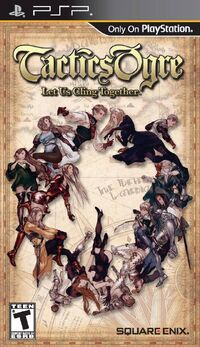| Tactics Ogre: Let Us Cling Together Tactics Ogre: Wheel of Fate | |
|---|---|
 Boxart for the American PSP release | |
| Developer(s) | Quest Square Enix (PlayStation Portable) |
| Publisher(s) | Super Nintendo Entertainment System
Square Enix |
| Director(s) | Yasumi Matsuno Hiroshi Minagawa (PlayStation Portable) |
| Designer(s) | Yasumi Matsuno |
| Artist(s) | Hiroshi Minagawa Akihiko Yoshida Tsubasa Masao (PlayStation Portable) |
| Writer(s) | Yasumi Matsuno |
| Composer(s) | Hitoshi Sakimoto Masaharu Iwata |
| Platform(s) | Super Nintendo Entertainment System Sega Saturn PlayStation Wii (Virtual Console) PlayStation Portable Wii U (Virtual Console) |
| Release date(s) | October 6, 1995
October 6, 1995
|
| Genre(s) | Tactical RPG |
| Mode(s) | Single player |
Tactics Ogre: Let Us Cling Together (タクティクスオウガ Takutikusu Ōga?) is a Japanese tactical role-playing game created by Quest. The game was originally released in 1995 on the Super Famicom in Japan and then re-released on the Sega Saturn in 1996 and the PlayStation in 1997.[4] A remake of the game developed by the original development team was released on February 15, 2011 for the PSP. In some regions, notably Japan, the remake was retitled as Tactics Ogre: Wheel of Fate.
Though Let Us Cling Together is the second entry released in the Ogre Battle franchise, it featured dramatically different gameplay than its predecessor. While Ogre Battle: March of the Black Queen was more akin to a grand strategy RPG, Let Us Cling Together was a more intimate squad-based isometric tactical RPG. Let Us Cling Together, then, launched a sub-series within the franchise with Tactics Ogre being used to distinguish the two forms of gameplay in later sequels (notably Tactics Ogre: The Knight of Lodis).
The subtitle of Let Us Cling Together is a reference to the Queen song "Teo Torriatte (Let Us Cling Together)" from their album A Day at the Races. This is one of many references to Queen songs in the series, including Ogre Battle: March of the Black Queen, which references "Ogre Battle" and "The March of the Black Queen".
